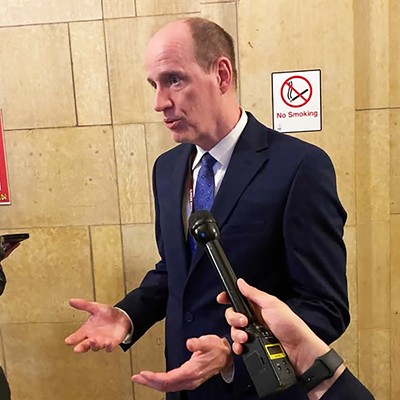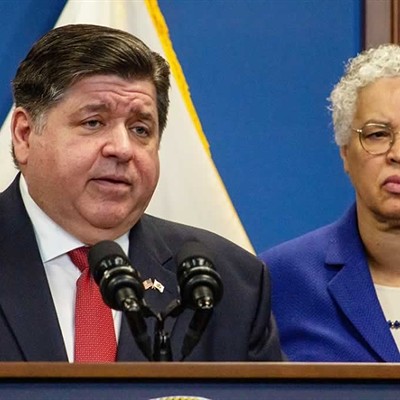Faced with budget and staff reductions at the Papers of Abraham Lincoln Project, the Abraham Lincoln Presidential Library and Museum is asking an ad hoc group of outside experts for recommendations.
One goal is to expedite online publication of documents either written by or read by Lincoln. “It is time to begin sharing this valuable work with the rest of the world,” Alan Lowe, ALPLM executive director, said in a press release.
Illinois Times has been unsuccessful in attempts to arrange an interview with Lowe, who started work at the museum last summer.
The ALPLM hopes to receive recommendations from the five-member group next month. The panel includes directors of digital publishing projects at universities and historical organizations in Virginia, Kentucky and Pennsylvania. The effort comes as Daniel Stowell, the project’s longtime director who was removed late last year, fights for reinstatement.
Carl Draper, Stowell’s lawyer, said that his client welcomes the panel’s appointment, but plans to start publishing the project’s work were already underway.
“Dr. Stowell is very happy to see more resources being brought to this – this is good news for the library,” Draper said. “But, with that being said, this isn’t a new development at all.”
Money and staffing have been hurdles, Draper said. The project’s staff has been cut in half since 2015. In appealing his dismissal, Stowell in a civil service commission hearing last month testified that his supervisors did not come up with funds to upgrade old software to make papers from Lincoln’s legal career, which were put online nearly a decade ago, more accessible to researchers (“Stowell fights firing at hearing,” March 2, 2017). According to testimony at the hearing, Stowell also tried to expand the role of volunteers in transcribing documents, but the effort was curtailed by Samuel Wheeler, state historian. It isn’t clear why Wheeler objected to the plan.
The project, which began in 1985, has already published documents from Lincoln’s legal career and started collecting other documents in 2000. Without being transcribed, the handwritten documents are largely useless. Among other things, researchers cannot search for names or keywords unless documents have been transcribed.
Chris Wills, spokesman for the Illinois Historic Preservation Agency that oversees the ALPLM, said that more than 50,000 documents, about half the number collected since 2000, have been transcribed. Nearly 3,600 have been annotated to provide context for researchers, he said, and 175 have undergone final review.
It is a Herculean effort – similar efforts involving George Washington and other historic figures have lasted as long as a half-century and remain incomplete.
“Of course, everybody wants to finish,” said Daniel Feller, director of the Papers of Andrew Jackson project at the University of Tennessee-Knoxville, who is part of the ad hoc panel. Thirty years after microfilming all of Jackson’s papers that had been located, the process of collection, transcription and annotation continues. Feller hopes to finish in 2030. “What you want to do when you’re in charge of a project like this is balance two imperatives,” Feller said. “One is, get finished – we all want to finish. The other one is, do it right so it doesn’t have to be done all over again.”
In Lincoln’s case, Feller said he believes it’s “a good decision” to publish what’s been completed so far. But there’s no getting around the impact of budget cuts. “You have fewer people, you do less work,” Feller said. Annotation, he said, is nearly as important as transcription. And the work can be highly specialized.
Feller cites the example of an unsigned, undated, unaddressed “Dear Sir” letter found in the papers of John Branch, naval secretary under Jackson, at the University of North Carolina. Feller’s team was familiar with the subject matter. The letter touched on the Eaton Affair, a brouhaha concerning rumors of promiscuity on the part of the secretary of war’s wife, that resulted in Jackson replacing his entire cabinet save for the postmaster general. “Branch was explaining to Jackson why he wouldn’t do what Jackson wanted him to do and why he shouldn’t be fired,” Feller says. “It’s the kind of letter you write four times before you send it off.”
But the letter, clearly a draft, wasn’t in Branch’s handwriting. Feller’s team had both the final version and sufficient experience with Jackson documents to connect dots. The letter was in the handwriting of Jackson’s nephew, and so historians had proof that a Jackson relative was helping cabinet members take sides against his uncle. “Unless you know Jackson, or in the case of Lincoln, inside-out, you’re not going to be able to do that kind of work,” Feller said.
Part of the ad hoc group’s task likely will be setting priorities. “Since the beginning of the program, it’s fair to say there’s been some expansion of the types of documents that have been collected,” Wills said. “And so, one of the things that the review team probably will weigh in on is, do you want to transcribe and annotate all of these documents? Or are some of them secondary…and can they be dealt with in some other way. You’re collecting documents of this type and this type and this type, we don’t think this type is all that important, you can stop doing that.”
Wills stopped short of saying that the project is being scaled back.
“That’s not my understanding,” he said.
Contact Bruce Rushton at [email protected].
Reviewing Lincoln
ALPLM taps panel to assess Lincoln papers project
[
{
"name": "Air - MedRect Combo - Inline Content 1",
"component": "11490391",
"insertPoint": "3",
"requiredCountToDisplay": "1",
"parentWrapperClass": "fdn-ads-inline-content-block"
},{
"name": "Air - MedRect Combo - Inline Content 2",
"component": "11490392",
"insertPoint": "7",
"requiredCountToDisplay": "5",
"parentWrapperClass": "fdn-ads-inline-content-block"
},{
"name": "Air - MedRect Combo - Inline Content 3",
"component": "11490393",
"insertPoint": "12",
"requiredCountToDisplay": "9",
"parentWrapperClass": "fdn-ads-inline-content-block"
}
]
Illinois Times has provided readers with independent journalism for almost 50 years, from news and politics to arts and culture.
Your support will help cover the costs of editorial content published each week. Without local news organizations, we would be less informed about the issues that affect our community..
Got something to say?
Send a letter to the editor and we'll publish your feedback in print!
















